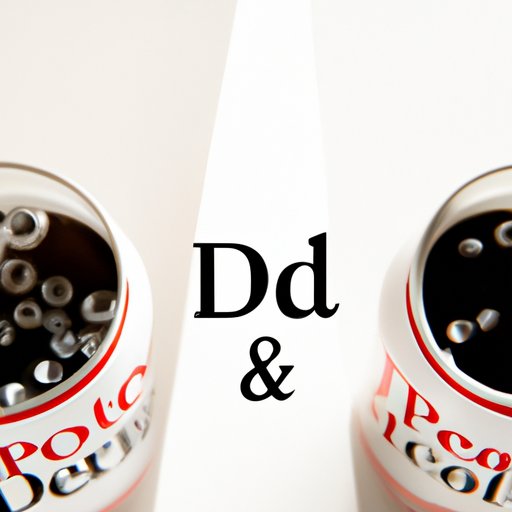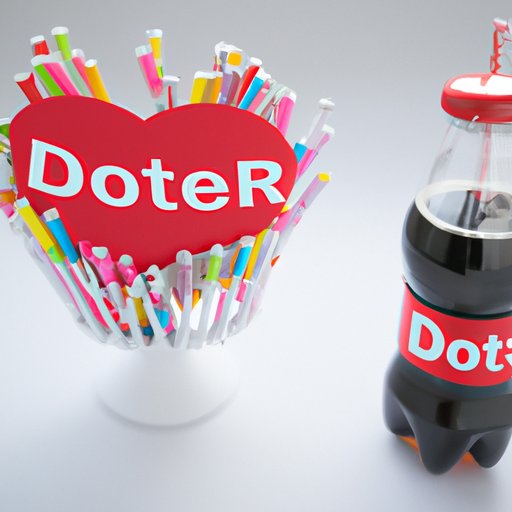Introduction
Diet pop has been a staple in many people’s lives for decades. It is often seen as a healthier alternative to regular sugary soda, but is it really? This article will take an in-depth look at the potential health risks associated with drinking diet pop. We’ll explore the possible link between diet pop and obesity, diabetes, and heart health, as well as the dangers of artificial sweeteners found in many diet sodas. We’ll also discuss strategies for limiting diet pop consumption to prevent weight gain and other health concerns.
Examining the Health Risks of Diet Soda
It’s no secret that regular soda is linked to a number of health risks, such as obesity, type 2 diabetes, and heart disease. But what about diet pop? Is it just as bad for you, or is it a safer alternative? Let’s take a closer look at the possible health risks associated with drinking diet pop.
Potential Link to Obesity
One of the main health concerns associated with drinking diet pop is its potential link to obesity. According to a study published in the American Journal of Clinical Nutrition, “The intake of artificially sweetened beverages was associated with increased risk of obesity.” The study also found that people who drank diet pop were more likely to gain weight over time than those who did not drink diet pop.
Possible Increase in Diabetes Risk
Another potential health risk associated with diet pop is an increased risk of type 2 diabetes. A study published in the journal Diabetologia found that “long-term consumption of artificially sweetened soft drinks was associated with an increased risk of incident type 2 diabetes.” The study also found that people who drank two or more cans of diet pop per day had a higher risk of developing type 2 diabetes than those who did not drink diet pop.
Heart Health Concerns
In addition to its potential link to obesity and diabetes, diet pop has also been linked to heart health concerns. According to a study published in the journal Circulation, “Regular consumption of artificially sweetened beverages was associated with an increased risk of stroke, myocardial infarction, and early death.” The study found that people who drank one or more cans of diet pop per day had a higher risk of stroke and heart attack than those who did not drink diet pop.
The Dangers of Artificial Sweeteners in Diet Pop
Many diet pops contain artificial sweeteners, which are chemicals designed to mimic the taste of sugar without adding calories. While these sweeteners can help give diet pops a sweet taste, they can also have some serious side effects. Let’s take a closer look at the dangers of artificial sweeteners.
What Are Artificial Sweeteners?
Artificial sweeteners are chemicals designed to mimic the taste of sugar without adding calories. They are commonly used in diet pops and other low-calorie foods and beverages. The most common types of artificial sweeteners are aspartame, sucralose, and acesulfame potassium.
Potential Side Effects of Artificial Sweeteners
Although artificial sweeteners are generally considered safe, there is some concern that they may have adverse effects on health. Studies have suggested that artificial sweeteners may be linked to an increased risk of metabolic syndrome, which is a cluster of conditions that includes high blood pressure, high cholesterol, and obesity. Additionally, some studies have suggested that artificial sweeteners may increase the risk of certain types of cancer.
FDA Regulations on Artificial Sweeteners
The U.S. Food and Drug Administration (FDA) regulates the use of artificial sweeteners in food and beverages. The FDA requires that all artificial sweeteners be approved before they can be used in products. Additionally, the FDA limits the amount of artificial sweeteners that can be used in products, and requires manufacturers to list artificial sweeteners on product labels.

Exploring the Link Between Diet Pop and Weight Gain
Many people turn to diet pop as a way to cut calories and lose weight, but is this really effective? Let’s explore the link between diet pop and weight gain.
How Does Diet Pop Contribute to Weight Gain?
Although diet pop can be a helpful tool for reducing calorie intake, it can also have the opposite effect. Studies have shown that drinking diet pop can lead to weight gain by increasing cravings for unhealthy foods. Additionally, some studies have suggested that artificial sweeteners may disrupt the body’s ability to regulate calorie intake, leading to weight gain.
Effects of Diet Pop on Metabolism
Research has also suggested that drinking diet pop can slow down metabolism. A study published in the journal Physiology & Behavior found that “consumption of diet soda was associated with slower resting metabolic rate.” The study also found that people who drank diet pop had lower levels of fat burning enzymes than those who did not drink diet pop.
Strategies for Limiting Diet Pop Consumption to Prevent Weight Gain
If you’re trying to limit your diet pop consumption to prevent weight gain, there are a few strategies you can try. First, try to limit your intake of diet pop to one can per day. Additionally, try to replace diet pop with healthier alternatives, such as water or unsweetened tea. Finally, be sure to read food labels carefully to ensure that you’re not consuming too much artificial sweetener.
Uncovering the Impact of Diet Pop on Diabetes
In addition to its potential link to obesity, diet pop has also been linked to an increased risk of type 2 diabetes. Let’s take a closer look at the impact of diet pop on diabetes.
How Does Diet Pop Affect Blood Sugar Levels?
Studies have suggested that drinking diet pop can lead to an increase in blood sugar levels. A study published in the journal Diabetes Care found that “drinking two or more servings of diet soda per day was associated with higher fasting glucose levels.” The study also found that people who drank diet pop had higher levels of insulin resistance than those who did not drink diet pop.
Effect of Diet Pop on Insulin Production
Research has also suggested that drinking diet pop can affect the body’s production of insulin. A study published in the journal Diabetes Care found that “drinking two or more servings of diet soda per day was associated with lower insulin sensitivity.” The study also found that people who drank diet pop had lower levels of insulin production than those who did not drink diet pop.
Alternative Beverages for People With Diabetes
If you have diabetes, it’s important to limit your intake of diet pop. Instead, try to opt for healthier alternatives, such as water or unsweetened tea. Additionally, if you’re looking for a sweet beverage, you can try adding a small amount of real sugar or honey to unsweetened tea or coffee. Be sure to talk to your doctor or dietitian about the best beverages for you.

Breaking Down the Pros and Cons of Diet Pop
Diet pop can be a helpful tool for reducing calorie intake, but it can also have some serious health risks. Let’s take a look at the pros and cons of drinking diet pop.
Pros of Drinking Diet Pop
One of the main benefits of drinking diet pop is that it can help reduce calorie intake. Additionally, diet pop can be a helpful tool for curbing sugar cravings. It can also be a good option for people with diabetes who are looking for a sweet beverage.
Cons of Drinking Diet Pop
Although diet pop can be a helpful tool for reducing calorie intake, it can also have some serious health risks. As we discussed earlier, diet pop has been linked to an increased risk of obesity, type 2 diabetes, stroke, and heart attack. Additionally, artificial sweeteners found in many diet pops can have adverse effects on health.

Investigating the Effects of Diet Pop on Heart Health
In addition to its potential link to obesity and diabetes, diet pop has also been linked to heart health concerns. Let’s take a closer look at the impact of diet pop on heart health.
How Does Diet Pop Affect Cholesterol Levels?
Studies have suggested that drinking diet pop can lead to an increase in cholesterol levels. A study published in the journal Metabolism found that “regular consumption of artificially sweetened beverages was associated with higher LDL cholesterol levels.” The study also found that people who drank diet pop had higher levels of total cholesterol than those who did not drink diet pop.
How Does Diet Pop Impact Blood Pressure?
Research has also suggested that drinking diet pop can increase blood pressure. A study published in the journal Hypertension found that “regular consumption of artificially sweetened beverages was associated with higher systolic blood pressure.” The study also found that people who drank diet pop had higher levels of diastolic blood pressure than those who did not drink diet pop.
Long-Term Consequences of Consuming Diet Pop
In addition to increasing cholesterol and blood pressure levels, drinking diet pop can also have long-term consequences for heart health. Studies have suggested that drinking diet pop can increase the risk of stroke and heart attack. Additionally, diet pop has been linked to an increased risk of death from cardiovascular disease.
Conclusion
Diet pop has been a popular choice for people looking to reduce their calorie intake, but is it really a healthier alternative to regular soda? This article has explored the potential health risks associated with drinking diet pop, including links to obesity, diabetes, and heart health. We’ve also looked at the dangers of artificial sweeteners found in many diet pops, and discussed strategies for limiting diet pop consumption to prevent weight gain and other health concerns. Ultimately, it’s up to you to decide whether or not diet pop is right for you.
(Note: Is this article not meeting your expectations? Do you have knowledge or insights to share? Unlock new opportunities and expand your reach by joining our authors team. Click Registration to join us and share your expertise with our readers.)
